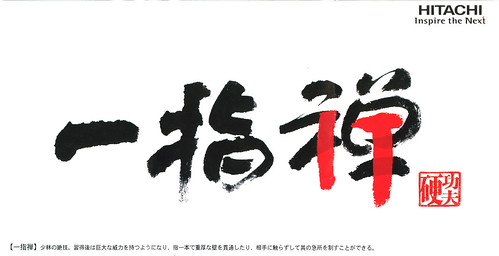02
Oct 2006"Obsolete" Chinese Words
People’s Daily has an article on the changing Chinese language entitled 49 obsolete Chinese words (part 1, part 2, part 3). The really annoying thing about the article, though, is that it tells you the English translation of the obsolete words without telling you what the actual Chinese words are. (The second most annoying thing about the article is that some of the words are definitely still in use.)
After Ken of ChinesePod blogged about the article, Olivia of the Academic Team provided a list of the Chinese words referred to in the article in parts 1 and 2. I reproduce that list here, adding the missing ones, and deleting some obvious ones (like VCD):
– neighbor 邻居 [I don’t really get this one; I still hear this word all the time]
– danwei (work unit) 单位 [this word is also not gone yet]
– poet 诗人
– reformer 改革家
– special zone 特区
– conductor (on buses) 公交售票员
– radio cassette player 收录机
– wanyuanhu (10,000+ yuan household) 万元户
– daoye (profiteer) 倒爷
– Chongqing of Sichuan Province 四川省重庆
– Royal Hong Kong Police Force 香港皇家警察
– welfare-oriented public housing 福利公房
– State Planning Commission 国家计划委员会
– Ministry of Posts and Telecommunications 国家邮电部
– Ministry of Electronics 国家电子工业部
– Hainan Development Bank 海南发展银行
– miandi (taxi van) 面的
– Idall (electronics brand) 爱多
– Millennium Bug 千年虫
– Fenhuang Cola 汾湟可乐
– mao (lit. “cat,” slang for “modem”) 猫
– family letter 家书,家信
– Blue Seal Household Register 蓝印户口
– fenbi (0.01 yuan coins) 分币
– dageda (big clunky mobile phones) 大哥大
– tianzhijiaozi (a name for university students) 天之骄子
– Yaxiya Department Store 亚细亚百货
– Old Fengjie Town 奉节古城 [picture on Flickr]
– jiefang shoes (“liberation” shoes) 解放鞋
– Super Variety Show 综艺大观 [official CCTV page]
– marital status certification 婚姻状况证明
If you have any revisions for this list, please leave a comment.
Notes: Kevin of Wefang Radish also discusses the People’s Daily article, as does Shanghaiist, where Micah points out in the comments that Danwei.org has published something similar before (but shorter, and also without the Chinese characters), citing New Weekly as the source.
01
Oct 2006Arming the Brats
My friend Heather sent me a link to a NY Times article called In China, Children of the Rich Learn Class, Minus the Struggle. The article talks about the great lengths to which China’s new rich are going in order to ensure their children the cultural education befitting of China’s new elite.
This passage about FasTracKids struck me:
> The private program’s after-school sessions are held in brightly decorated classrooms, where fewer than a dozen children, typically 4 or 5 years old, are taught by as many as three teachers. The program emphasizes scientific learning, problem solving and, most attractively for many parents, assertiveness.
Yes, that’s right, assertiveness. So now that these people have gotten so adept at raising spoiled brats, the next step is to raise assertive spoiled brats.
Yikes.
29
Sep 2006Hoes Before Bros (in Chinese)
Recently on ChinesePod we were developing a lesson that uses the expression 重色轻友. Literally it means something like “heavy sex light friendship.” The idea here is valuing one’s love interests over one’s friends. In translating this phrase, the immediate English translation that sprang to my mind was “hoes before bros,” a phrase I first heard a few years ago from Wilson (in an intellectual discussion on intersexual nomenclature, of course).
Obviously “hoes before bros” isn’t quite appropriate for our site. But really, it seems to be the only set prase for the phenomenon in English. Am I missing one?
Note 1: The word “ho” has always troubled me — and not just because it’s misogynistic in nature! As a shortened form of “whore,” “ho” just doesn’t look right to me. And is the plural “hoes” (which invites confusion with gardening tools) or “hos”? There are precedents for both.
Note 2: Another common example of the 重X轻Y pattern is 重男轻女, which refers to the cultural phenomenon of valuing males over females. Do you know any others?
27
Sep 2006Busy + Pecha Kucha
Busy week. We’re preparing for the October holiday at work, which means getting an extra week’s worth of work done ahead of time. Plus, I found out those essays I wrote got decent grades, and I’m eligible for a scholarship. I will be pretty stoked if this goes through. I have to hand in the complete application by the end of this week.
This also happens to be the week I got asked to do a presentation for Pecha Kucha Night. I was surprised that I was even asked. I’m not an architect or designer or artist or whatever. But I decided to go ahead and do it. My topic is How the Internet Hijacked My Life in China. If you’re a friend of mine, you might just find yourself in the presentation.

24
Sep 2006The triple 'dui'
Today on ChinesePod there was an intermediate lesson called Growing Affections. A commenter named Trevor Morley called attention to a linguistic phenomenon which he aptly dubbed “the triple dui” (that’s “triple 对,” not to be confused with “triple DUI“). This “对对对” is something I’ve noticed myself, and I’ve been observing it for a while.
对 means “right,” and as English speakers, I think it’s pretty easy for us to understand how it could be used in triplicate. We sometimes say, “right, right, right” in conversation when we are agreeing with what another person is saying. 对 is a monosyllabic word, so the triple dui is actually a repitition of a monosyllabic word three times just as “right, right, right” is in English; it’s not like 谢谢, which is a disyllabic word composed of one repeated morpheme.
What makes it interesting (to some of us) is that the triple dui seems to be used in spoken Mandarin much more than you would expect if it were left up to chance. Furthermore, the majority* of Chinese words are bisyllabic, which might lead one to expect an underlying trend of “twos” in Chinese. In this case, however, the triple dui seems to be as popular as the double dui (if not more so).
I don’t have any hard data to back up any of these observations (even search engines put “对对” way ahead of “对对对”), and it might also be a regional phenomenon. Any thoughts and/or reports from other parts of China?
*This fact belongs to the realm of generally accepted linguistic knowledge about the Chinese language, but if you want more info, you might check out Stress and the Development of Disyllabic Words in Chinese (PDF file) by San Duanmu.
21
Sep 2006Critical Discourse Analysis in China
I had my third Critical Discourse Analysis (批评性话语分析 or CDA) class today. I was really starting to wonder what was up with that class, but I finally got it straight. You see, having no prior significant exposure to the field, I had this simple understanding of “discourse analysis” as basically “analyzing discourse.” It goes a bit beyond that. But CDA is even further removed:
Critical discourse analysis has made the study of language into an interdisciplinary tool and can be used by scholars with various backgrounds, including media criticism. Most significantly, it offers the opportunity to adopt a social perspective in the cross-cultural study of media texts. As Gunter Kress points out, CDA has an “overtly political agenda,” which “serves to set CDA off…from other kinds of discourse analysis” and text linguistics, “as well as pragmatics and sociolinguistics.” While most forms of discourse analysis “aim to provide a better understanding of socio-cultural aspects of texts,” CDA “aims to provide accounts of the production, internal structure, and overall organization of texts.” One crucial difference is that CDA “aims to provide a critical dimension in its theoretical and descriptive accounts of texts.” [source]
Hmmm, so that explains why the first two weeks we kept talking about ideology (意识形态) rather than discourse itself. The key theorists we have examined already are:
– Karl Marx (马克思) – assumed background knowledge
– Antonio Gramsci (葛兰西)
– Louis Althusser (阿尔都塞)
– Jürgen Habermas (哈贝马斯)
– Michel Foucault (福柯)
Can you see why the Chinese might be into this stuff? They even have a great word for it: 西马. That means something like “modern Western Marxist theory.” I get a kick out of that term. It seems like such a simple word, made up of two very basic characters, but it represents such a complex body of theory.
My current teacher has a philosophical crush on Foucault just like my first semester teacher had a philosophical crush on Wittgenstein. (In my personal experience, all female Chinese professors have a thing for brilliant gay philosophers.)
Before today’s class I had to read Althusser’s Ideology and Ideological State Apparatuses (意识形态与意识形态国家机器). These days I’m kinda short on time, though, so I had a little help. I don’t feel guilty… I think by “cheating” I understood the content better than my classmates, whose comments on the text mostly amounted to, “it was confusing.”
I’m not the kind of person that gets off on this kind of philosophical stuff. Sometimes I feel like an anti-intellectual (or maybe I’m just simple-minded?). To tell the truth, I’m rather disappointed with this semester’s classes. My major is “applied linguistics,” and I really am looking for material with application. I’m no longer a wide-eyed student eager to soak up any and all knowledge; I readily discard the information I feel I have no use for, and I don’t have a high tolerance for material I find overly theoretical with little practical value.
Today, though, CDA got a little more interesting. We starting actually applying the ideological framework we’d been discussing. It looks like we’re going to be looking at a lot of advertisements and analyzing them in the contexts of gender roles, social values, consumerism, etc. I was a little disappointed that our scope was going to be so focused, but I’ll certainly take analysis of ads over analysis of things like “the reproduction of the conditions of production” (Althusser) any day.
I suggested that we analyze TV commercials from past American presidential campaigns, and my teacher liked the idea, but she asked me to find them. Does anyone know where I can get that kind of video? I need the actual files, not just YouTube links (and the classroom computer is not going to support weird .flv files). Thanks!
19
Sep 2006Chineseblast
While surfing Chinese-forums.com, I discovered a promising new website for learners of Mandarin Chinese: Chineseblast (“collaborative learning engine for Chinese”). The site revolves around users’ “projects” (which usually means translation projects). The community contributes to projects both in adding and editing the translations themselves, as well as in adding comments and questions.
It very much reminds me of manga/anime fans’ community efforts at translating Japanese, but in the case of Chineseblast, the content translated isn’t so concentrated on one theme. Furthermore, different forms of media are covered by the projects:
1. Text Lessons – often similar to textbook offerings, but with audio (example: Joining the Revolution)
2. Video – often hosted on YouTube (example: Taiwanese soap opera)
3. Podcast – native Chinese shows (example: Princess Remy)
I like the variety — variety of content, of media, of language. You get audio and video, you get Mandarin and Cantonese, you get Taiwanese Mandarin and mainland Mandarin, you get traditional and simplified characters. I also like the way the video pages are designed, allowing you to scroll through the script as you watch a video. The small, gray literal translations above the more natural translations are also a nice touch.
It seems that most of the content is aimed at intermediate-level users. If that’s you, check it out.
18
Sep 2006the lively art of writing and the elements of style
My friend Josh recently returned to Shanghai after finishing his masters and is looking for work. He sent me the following text message:
> Josh: do you have the lively art of writing and the elements of style?
My first impulse was that he was passing on some kind of Chinglishy inquiry he had gotten. The conversation continued something like this:
> me: [confidently playing along] i sure do!
> Josh: Can I borrow them?
> me: [having my doubts about Josh’s sense of humor] well, i might need them.
> Josh: ok, i’m going to try to find them on fuzhou lu.
> me: [thoroughly confused] huh??
As you may know, The Lively Art of Writing and The Elements of Style
are two (quite well-known) books. In the context of the text message, which lacked proper punctuation and the like, I was totally thrown off.
Text messages: sly saboteurs of communication.
17
Sep 2006Mother Teresa (1910—1997)
你知道Mother Teresa(中文名字包括:特蕾莎修女、德雷莎修女、德兰修女)是谁吗?还没来中国的时候我以为全世界都知道她,后来发现大部分的中国人却没有听说过。
“超越梦想的皮皮”在博客上有介绍:
> 德兰修女是阿尔巴尼亚人,但她一生都在印度的加尔各答为穷人服务,所以大家都称她印度修女。德兰修女是1979年诺贝尔和平奖的获得者,她是继史怀泽博士1952年获得诺贝尔和平奖以来,最没有争议的一个得奖者。她除了被誉为“穷人的圣母”外,还被誉为“慈悲天使”、“贫民窟的守护者”、“贫民窟的圣人” 等等。
“超越梦想的皮皮”还有德兰修女语录(原文是英文):
> 人们经常是不讲道理的、没有逻辑的和以自我为中心的
不管怎样,你要原谅他们
> 即使你是友善的,人们可能还是会说你自私和动机不良
不管怎样,你还是要友善
> 当你功成名就,你会有一些虚假的朋友和一些真实的敌人
不管怎样,你还是要取得成功
> 即使你是诚实的和率直的,人们可能还是会欺骗你
不管怎样,你还是要诚实和率直
> 你多年来营造的东西有人在一夜之间把它摧毁
不管怎样,你还是要去营造
> 如果你找到了平静和幸福,他们可能会嫉妒你
不管怎样,你还是要快乐
> 你今天做的善事,人们往往明天就会忘记
不管怎样,你还是要做善事
> 即使把你最好的东西给了这个世界,也许这些东西永远都不够
不管怎样,把你最好的东西给这个世界
> 你看,说到底,它是你和上帝之间的事
而决不是你和他人之间的事
> –德兰修女
Mother Teresa对世人各种疑惑所给予的解答:
> 最美好的一天?
今天
> 最简单的事?
犯错
> 最大的阻碍?
害怕
> 最严重的错误?
自暴自弃
> 万恶的根源?
自私
> 最好的休闲活动?
工作
> 最深重的挫败?
灰心
> 最好的老师?
儿童
> 最优先的需要?
沟通
> 最令人快乐的事?
帮助别人
> 人生最大的谜?
死亡
> 人最大的缺点?
坏脾气
> 最危险的人物?
说谎者
> 最低劣的感觉?
怨恨
> 最宝贵的礼物?
宽恕
> 最不可或缺的?
家庭
> 最短的捷径?
直路
> 最使人愉悦的感觉?
内心的平安
> 最幸福的保单?
微笑
> 最有效的解决之道?
乐观
> 最大的满足?
完成该做的事情
> 全世界最强大的力量?
父母
> 最大的喜乐之一?
拥有真正的朋友--知道有人与你同在,即使他们不一定能帮你解决问题
> 世界上最美丽的?
爱
我实在想不出比Mother Teresa更伟大、更美丽的女人。
17
Sep 2006Time-Lapse Chinese Dinner
When I think “time-lapse photography” I don’t think “Chinese food,” but it really was a good idea. The meal really gets going about halfway through.
15
Sep 2006Open Salaries: Not for China
I recently discussed the article Why Secret Salaries Are a Baaaaaad Idea with my Chinese friend Mike. It’s an interesting read. The main points the article makes for why open salaries are a good idea:
1. Salaries will become more fair. The system gets a chance to adjust itself.
2. It will be easier to retain the best employees because they’re more likely to feel they’re getting a fair salary.
3. The pressure is on the people with the high salaries to earn their keep. Everybody has to pull their weight – the higher the salary, the larger the weight.
Mike is an accounts manager for a Chinese company in Shanghai, and he has business experience in several companies. Unsurprisingly, he was convinced such an idea could never work in China. The main ideas we discussed:
– The open salary system is based on an overall assumption that the boss is devoted to the idea of a fair workplace. In Mike’s words, “no Chinese boss wants to be fair.” The average Chinese boss exploits unfairness to the benefit of the company. The example he gave is that for the exact same job, a Shanghainese employee might be paid 5,000 RMB per month, whereas an employee from Gansu would only get 1,000. That’s just the way it is.
– Many Chinese companies keep two sets of books in order to pay less taxes. If the company were to make public the fake books, it’s a meaningless action. But you obviously can’t make the real books public.
– Mike’s conclusion: “It’s a nice idea in theory, but it would never work in reality. It’s like Communism!“
13
Sep 2006Oyo! Shanghai's Subway Video Shopping Guide
哦哟! is a Chinese expression that means something like, “whoa!” But 哦哟!视频 (www.oyoo.com) is a video guide to the shops along Shanghai’s subway lines. Ads for the new website are currently plastered all over the Shanghai subway system.
It’s an interesting concept. You take a bunch of short videos, set them to poppy music, and put them on the site in YouTube fashion. But the videos taken are all of shops along Shanghai’s subway line. They’re organized by subway stop as well as by category: 好吃 (food), 好玩 (entertainment), 好看 (clothing and accessories), 好家 (home decoration/furnishing), 好学 (education), 好朋友 (partners?).
I must say, the videos offered are all pretty dull (with the possible exception of the “Transformer Heaven” shop video); they’re all basically just poorly shot commercials. I also don’t see a lot of evidence of activity. I’m not sure that 时代报 (Metro Express) has what it takes to make this site work, but it’s good to see the Chinese experimenting. Other encouraging signs: the site is relatively free of the cluttered design that plagues Chinese websites, and the page looks fine in Firefox!
12
Sep 2006Jonathan Yuen: Flash Design with Chinese Style
Jonathan Yuen has a really cool Flash design site. Check it out; it is totally unannoying, and pleasantly imaginative. It also uses Chinese. Unfortunately, the Chinese characters are small and hard to read, and Flash’s normal zoom option is turned off. So here’s my transcription of the Chinese from the site:
> 思源
寻找的终点最终依然是起点
> 创意
能感动人心的才是至高境界
> 童心
用中庸的心态来审观一切
> 邂逅
尽管是僵然也应顺其自然
Sorry, no time for a translation now. Try copying and pasting into AdsoTrans. Maybe I’ll get a chance to put up a translation later. Also, I’m a little unsure of two unfamiliar words (which were a little hard to make out): 审观 and 僵然. Anyone who wants to jump in and translate in the comments, knock yourself out!
11
Sep 2006Papers, New Classes, and Friends
Recent events:
– Saturday, Sept. 2, I stayed home and wrote a 4,000 character paper for a class.
– Sunday, Sept. 3, I stayed home and wrote a 4,000 character paper for another class.
– Monday and Tuesday nights, Sept. 4-5, I worked on a 3,000 character paper for still another class.
– Wednesday night, Sept. 6, Pepe helped me clean up my papers. Alf showed up.
– Thursday, Sept. 7, I turned in my three papers and attended my two new classes for the semester: Semantics and Pragmatics and Critical Discourse Analysis.
– Friday, Sept. 8, I went to meet Greg at the airport with Alf and John B.
– Saturday, Sept. 9, I went to meet my friend Nobuhiko at the airport.
Thoughts:
– Procrastination is bad. I know this. Sort of.
– Not much beats seeing good friends again. Especially over hot pot and beer.
– A new semester is here already, and I still have a list of linguistic topics I meant to blog about over the summer. (Does anyone enjoy the linguisticky posts?)
07
Sep 2006Sidney Rittenberg
Hank pointed me to an interesting interview with Sidney Rittenberg yesterday. There are various people which call themselves “sinologists” in the world, but I’d have to say that Sidney Rittenberg is one of the most hardcore I know of. You might thing the guy was a little nutty for joining the CPC as an American Marxist back in the 1940’s, but reading the interview he seems quite clear-headed and balanced in his views. (Maybe the clarity came during all the thinking he did in 16 years of solitary confinement in China?)
I still don’t want to be a sinologist, but Sidney Rittenberg is definitely a figure worth learning more about. I’d love to have a chat with him. Here are some more links:
– Sidney Rittenberg Wikipedia entry
– Remarks at the Asia Society Hong Kong Center 12th Annual Dinner (includes Q&A session)
– Future in Review: short bio
– Sidney Rittenberg’s book: The Man Who Stayed Behind
05
Sep 2006Kindness and Courtesy in Shanghai
I thought this kind of thing could only be seen in movies and comic books. A very old lady slowly shuffled to the edge of the street. As the light changed she glanced fearfully to both sides, looking very uncertain at the start of her journey across the street. A middle-aged woman–clearly a stranger–appeared at the elderly lady’s side and exchanged a word or two in greeting. The old woman then gratefully held onto her savior’s arm as she was very patiently led to the safety of the opposite curb.
The other day I was working when I got a call on my cell phone from an unfamiliar number. I picked up my cell phone, but before I could answer it, the call stopped. Figuring it was a wrong number, I went back to work without giving it a second thought.
Then I received a text message. The message read (in Chinese):
> I dialed the wrong number just now. Sorry about that!
Some mornings on the subway when I’m packed in tight with the commutants, it’s all I can do to just stay stone-faced and hang onto my sanity. Other mornings, I notice things. Instead of pushing, I see people actually talking. They say things like, “Are you getting off at the next stop?” and “Excuse me, I need to get off at the next stop.” What’s more, the other person politely steps aside!
Today on the way home from work, after the subway doors opened and expelled us, we surged up the stairs as a group. On the way up the stairs, in two separate incidents, two men just barely bumped into me. Both promptly apologized.
Kindness and courtesy in Shanghai: there have been multiple sightings. There will be more. Keep your eyes open.
03
Sep 2006Church Boy Badtones
On ChinesePod we recently did a podcast lesson about being misunderstood because of incorrect tones, and then getting corrected (in Chinese). It prompted quite a few comments, including this amusing little anecdote in a comment from lostinasia:
> The only time I can recall when I had a substitution problem like this was asking for sauce (jiang4 [酱]) and instead saying ginger (jiang1 [姜]). (Ginger wasn’t totally out of place with the hot pot, but I still wished I’d received the sauce). Oh, and for the longest time at tea stands I asked for “jiao4 tang2″ [教堂] (=church) tea instead of “jiao1 tang2″ [焦糖] (=caramel) tea. They understood me, given the context, but when I finally got it right they commented that for weeks they’d been enjoying my mistake, and I’d become known as “Church Boy”, or something like that. But there are countless other times when people simply haven’t understood me, and my tones are surely a big part of that.
Oh yes, I’ve certainly been there.
02
Sep 2006“死白鬼”反对种族歧视
Say Bok Gwai(死白鬼)是旧金山的一个硬核朋克(harcore punk)乐队,主唱是华裔。
其实我自己不太喜欢大部分的硬核朋克,但是下面的采访很有意思(而且有中文字幕)。
来源:Danwei TV
02
Sep 2006One Finger Zen IT
I found this Japanese Hitachi ad in a local Japanese magazine. I really like seeing Chinese characters played with in creative ways. This is just one example.
The characters in the ad are 一指禅, which I have written about before.







